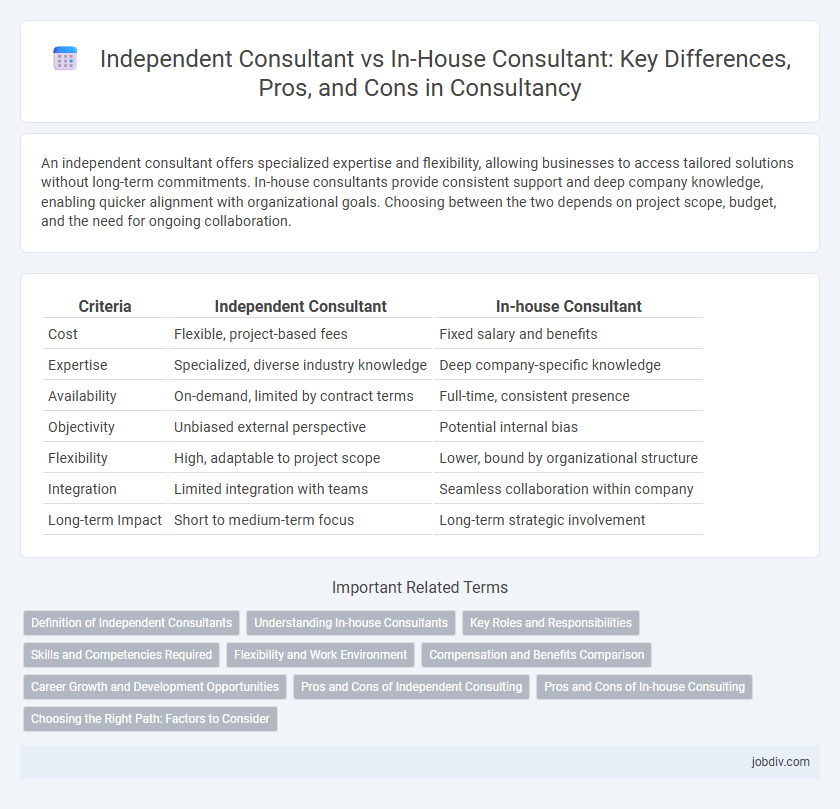An independent consultant offers specialized expertise and flexibility, allowing businesses to access tailored solutions without long-term commitments. In-house consultants provide consistent support and deep company knowledge, enabling quicker alignment with organizational goals. Choosing between the two depends on project scope, budget, and the need for ongoing collaboration.
Table of Comparison
| Criteria | Independent Consultant | In-house Consultant |
|---|---|---|
| Cost | Flexible, project-based fees | Fixed salary and benefits |
| Expertise | Specialized, diverse industry knowledge | Deep company-specific knowledge |
| Availability | On-demand, limited by contract terms | Full-time, consistent presence |
| Objectivity | Unbiased external perspective | Potential internal bias |
| Flexibility | High, adaptable to project scope | Lower, bound by organizational structure |
| Integration | Limited integration with teams | Seamless collaboration within company |
| Long-term Impact | Short to medium-term focus | Long-term strategic involvement |
Definition of Independent Consultants
Independent consultants are self-employed professionals who offer specialized expertise to multiple clients on a project or contract basis, providing flexibility and customized solutions without long-term commitments. Unlike in-house consultants, they operate outside the client organization, managing their own schedules, fees, and business operations. This autonomy enables independent consultants to deliver unbiased advice and diverse industry insights tailored to each client's unique needs.
Understanding In-house Consultants
In-house consultants are employees embedded within an organization, offering specialized expertise tailored to the company's strategic goals and operational needs. Their continuous integration enables deeper organizational knowledge, fostering long-term project alignment and faster decision-making compared to external consultants. Understanding the role of in-house consultants highlights their value in driving internal innovation and sustaining competitive advantage through consistent collaboration.
Key Roles and Responsibilities
Independent consultants offer specialized expertise with flexible project-based engagements, focusing on strategic advisory, problem-solving, and delivering tailored solutions across diverse industries. In-house consultants work internally within an organization, emphasizing operational improvements, cross-departmental collaboration, and continuous process optimization aligned with corporate goals. Both roles require strong analytical skills, stakeholder communication, and the ability to drive actionable insights, but independent consultants often handle broader client portfolios while in-house consultants maintain deep organizational knowledge.
Skills and Competencies Required
Independent consultants require strong self-management, client relationship abilities, and adaptability to diverse industries, while in-house consultants focus on deep organizational knowledge, internal stakeholder collaboration, and long-term strategic alignment. Both roles demand analytical thinking, problem-solving skills, and effective communication, but independent consultants emphasize business development and personal branding. Mastery in project management software, industry-specific tools, and continuous learning are critical competencies across both career paths.
Flexibility and Work Environment
Independent consultants enjoy greater flexibility in choosing projects, clients, and work hours, allowing for tailored work environments that foster creativity and autonomy. In-house consultants often work within structured corporate settings, benefiting from consistent resources and direct access to internal teams but facing less control over schedules. The decision between independent and in-house consultancy depends on priorities for work-life balance, project diversity, and environmental preferences.
Compensation and Benefits Comparison
Independent consultants typically command higher hourly rates compared to in-house consultants due to their specialized expertise and the absence of long-term employment benefits. In-house consultants often receive comprehensive compensation packages that include health insurance, retirement plans, paid leave, and performance bonuses, which are generally not available to independent consultants. While independent consultants must manage their own taxes and benefits, they benefit from greater flexibility and the potential for diversified income streams across multiple clients.
Career Growth and Development Opportunities
Independent consultants often experience accelerated career growth by engaging with diverse projects and clients across various industries, enhancing their expertise and marketability. In-house consultants benefit from structured development programs, stable career progression, and deeper organizational knowledge that supports long-term skill specialization. The choice between independent and in-house consultancy hinges on priorities for flexibility, exposure, and professional advancement pathways.
Pros and Cons of Independent Consulting
Independent consultants offer flexibility, autonomy, and the ability to work with diverse clients, allowing for varied project experience and skill enhancement. They face challenges such as income instability, lack of employee benefits, and the need for self-marketing and client acquisition. Compared to in-house consultants, independent consultants must manage administrative tasks and business development but gain control over their workload and work environment.
Pros and Cons of In-house Consulting
In-house consulting offers deep company-specific knowledge and direct access to internal resources, enhancing tailored solutions and faster decision-making. However, it may face limitations such as potential bias, slower innovation due to lack of external perspectives, and constraints on scalability in handling diverse projects. Balancing cost-effectiveness and organizational alignment often makes in-house consultants valuable for continuous, long-term strategic initiatives.
Choosing the Right Path: Factors to Consider
Choosing the right consultancy path depends on factors such as project scope, flexibility needs, and budget constraints. Independent consultants offer specialized expertise and agility for short-term or niche projects, while in-house consultants provide continuity, deep organizational knowledge, and long-term strategic alignment. Evaluating the company's goals, internal resources, and desired level of control helps determine the most effective consulting approach.
Independent Consultant vs In-house Consultant Infographic

 jobdiv.com
jobdiv.com